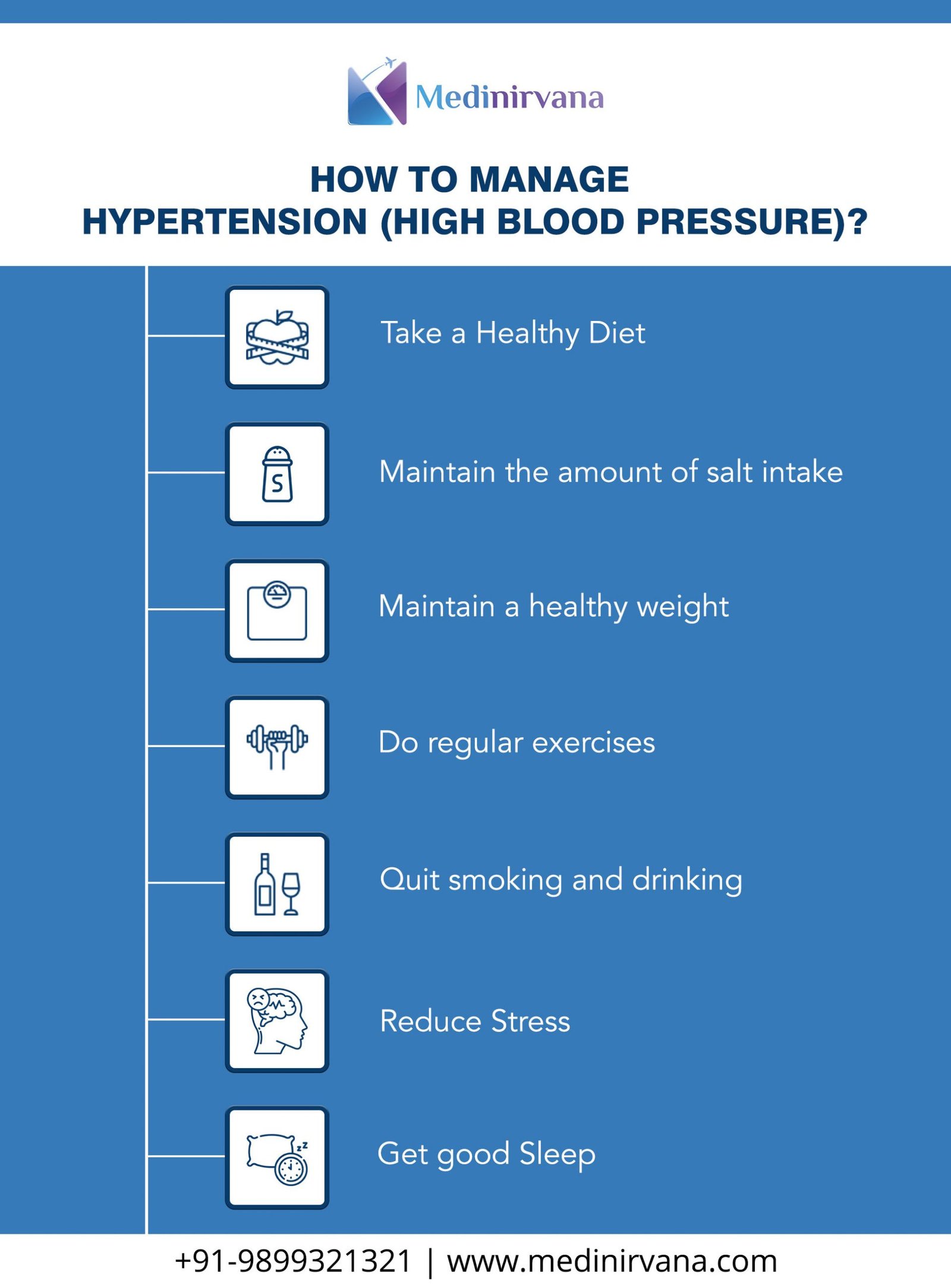The Hypertension issue has been increasing in the world. Hypertension or high blood pressure affects more than 1.2 billion people globally. It is a leading cause of death and also an increasing financial burden on the healthcare system.
Hypertensive heart disease is the primary cause of death that occurs due to hypertension. Approximately 54% of strokes and 47% of Coronary Heart Diseases are caused by hypertension.
The ever-increasing numbers of hypertension and Hypertensive heart diseases make it imperative to raise awareness about this topic.
In this article, we will talk about Hypertensive heart diseases treatment in India and the various commonly asked questions, such as “What causes high blood pressure?”, “How to prevent high blood pressure?” and Hypertensive Heart Disease guideline in 2021.
Feel free to skip ahead if one topic catches your eye:
- What is a Hypertensive Heart Disease?
- Causes of Hypertensive Heart Disease?
- Signs and Symptoms.
- How is it Diagnosed?
- Treatment of Hypertensive Heart Disease in India during Covid
- Why choose India for treatment of Hypertensive Heart?
1. What is a Hypertensive Heart Disease?
Hypertensive heart disease refers to a group of heart diseases that are caused because of hypertension. The increased pressure of blood flow causes more stress and workload on the heart. It damages the heart in various ways, leading to different hypertensive heart diseases.
Before we go into high blood pressure heart disease, it is essential to know about hypertension and its causes. The normal blood pressure in humans is 120/80 mm of Hg as measured by a sphygmomanometer. When this reading increases above 139/89 mm of Hg, the resultant condition is called high blood pressure or hypertension.
Several factors put you at an increased risk for hypertension, such as:
- Being overweight or obese
- Inadequate or no physical activity
- Consumption of high amounts of salt and low quantities of fruits and vegetables
- Smoking
- Excessive consumption of coffee or alcohol
- Age above 65 years
- Family history of hypertension, etc
Other than this, some other diseases can cause hypertension, such as:
- Diabetes
- Kidney disease
- Obstructive sleep apnea
- Narrowing of arteries of kidneys, etc
Long-term hypertension can lead to the development of hypertensive heart disease. These can be of different types like:
- Coronary Heart Disease or CHD
- Left Ventricular Hypertrophy or LVH
- Hypertrophic cardiomyopathy
- Congestive heart failure
- Atrial fibrillation
- Diastolic dysfunction
Complications of various types of hypertensive heart disease, like CHD and LVH, include:
- Heart failure
- Arrhythmia
- Ischemic Heart Disease
- Heart attack
- Sudden cardiac arrest
- Stroke
- Sudden death
2. Causes of Hypertensive Heart Disease
Hypertensive heart disease occurs because of two main reasons.
- Narrowing of the arteries that supply blood to the heart
- Thickening of the heart muscle
Narrowing of the arteries that supply blood to the heart
While the heart pumps blood to every organ of our body, the heart muscles also require oxygen and nutrients to function properly. This is achieved by the coronary arteries that supply oxygen to the heart muscles.
These coronary arteries can get narrowed because of hypertension causing Coronary Heart Disease or CHD. This is also known as CAD or Coronary Artery Disease. Because of the narrowing of the arteries that supply blood to the heart, the heart cannot get an adequate amount of oxygen and nutrients.
Unavailability of oxygen leads to the death of the heart muscles. Due to this, the heart can not function properly, and other organs do not get enough oxygen, leading to heart failure. When a significant number of the heart muscle dies, it can even lead to a heart attack.
Sometimes, a blood clot can get stuck in these already narrow Coronary arteries, leading to sudden cardiac ischemia (sudden cardiac death) and heart attack.
Thickening of the heart muscle
High pressure of the blood flow makes it difficult for the heart to function properly and puts extra pressure on the heart muscle to pump blood. Coupled with decreased blood supply to the muscles due to narrowing Coronary arteries, the heart is unable to pump enough blood. To compensate for this insufficiency, the heart muscles thicken and become enlarged.
While this provides temporary relief in a way by providing adequate blood to the organs, this changes the functioning of the heart, causing problems. This is noticed on the left ventricle of the heart because it is mainly responsible for most of the blood pumping.
This causes LVH or Left Ventricular Hypertrophy. LVH can also lead to heart failure and other complications like arrhythmias, sudden death, and more.
It is essential to know that hypertension is one of the main risk factors for these causes, forming a vicious cycle. CAD leads to LVH because the heart has to work harder, and LVH can compress the coronary arteries leading to CAD.
3. Signs and Symptoms
Specific signs and symptoms will depend on the exact high blood pressure. Still, these are the common symptoms that are seen in hypertensive heart disease:
- Chest pain or angina
- Shortness of breath
- Fatigue and weakness
- Swelling in the feet or legs
- Chest tightness
- Persistent cough
- Loss of appetite
- Pain in the arms, shoulders, neck or back, etc
If you experience any of these symptoms, you should immediately report these to a doctor.
People at the highest risk for developing high blood pressure heart disease and its complications are the ones who have the following risk factors in addition to high blood pressure:
- Diabetes
- People who are overweight or obese
- Smoking or excessive alcohol consumption
- Eating a lot of fat in food
4. How is it Diagnosed?
When you report to your doctor with any of the following symptoms, they will take your detailed medical history. This will include all previous medical problems, your dietary information, information about smoking or alcohol, family history, and much more. After the history, the doctor will conduct a physical examination on you. This will involve listening to your heart for any problematic heart sounds, checking your other organ systems like the respiratory system, etc.
Apart from this, some blood tests and other tests will be conducted for you. These blood tests check the functioning of your kidneys, sodium and potassium levels, sugar levels, etc., to rule out other risk factors.
Tests done to check the functioning of your heart include the following:
- Electrocardiogram or ECG
- Echocardiogram
- Stress echocardiography
- Coronary angioplasty
Electrocardiogram or ECG
During this test, various probes are attached to your limbs and chest. This test checks the activity and the beating of the heart. This is the easiest method for assessing the functioning of the heart.
Echocardiogram
This is an ultrasound technique that checks the functioning of the heart even more accurately. It can see the thickening of the heart muscles as well.
Stress echocardiography
This is a similar test as an echocardiogram. Only this is done while the person is exercising. This test is done to check the effects of exercise on the heart.
Coronary angioplasty
This is a more advanced and invasive test that checks the patency of the coronary arteries. In addition, it can check the extent of narrowing of the arteries, which can help make the right treatment strategies.

5. Treatment of Hypertensive Heart Disease in India during Covid
The exact hypertensive heart disease treatment will depend on your age, the severity of illness, and other risk factors. However, two types of treatment are usually advised to the patients.
- Medical treatment
- Surgical treatment
Medical treatment
Medications are usually prescribed to patients with less severe diseases. They are mainly aimed at increasing blood flow to the heart and preventing the development of clots in the blood. You must take all your medications properly, without fail.
Some of the common medicines include:
- Antihypertensive medications
- Medicines to treat symptoms like chest pain
- Medications to lower cholesterol
- Aspirin, to prevent formations of clots, etc.
Surgical treatment
Surgical treatment is done for people who have more severe diseases and require immediate intervention. Surgical treatment includes Coronary Angioplasty, pacemaker placement, CABG, etc. These are done to either surgically increase the blood flow to the heart or correct the heart’s beating.
The cost of hypertensive heart disease treatment in India depends on several factors like:
- The city you choose to get your treatment
- The hospital or clinic where you get your treatment
- The skill and expertise of your treating doctors and surgeons
- The severity of your disease and other risk factors
- The exact treatment that will be advised to you
The cost of open heart surgeries in India range between Rs 1.75 lakh to 4.25 lakh. Coronary angiography is likely to cost Rs. 10,000 to Rs. 15,000 for one round. Additional costs for medicines and other tests will be added to your treatment costs.
6. Why choose India for treatment of Hypertensive Heart?
India is one of the most preferred countries to get any kind of medical treatment. India is the best country to treat hypertension and all its related complications. Several factors make India the best country to get hypertensive heart disease treatment in India, such as:
- Easy to get Medical Visa
- Affordable Treatment
- Skilled and Experienced Cardiologists
- Excellent Covid Management facilities
- Pre and post-surgical care
Easy to get Medical Visa
It is relatively effortless to get a medical visa for treatment in India. This makes it easier for you and your family to focus on the treatment and not on the formalities. Also, Medinirvana will help you at every stage of the process to make the experience comfortable for you.
Affordable Treatment
India is one of the cheapest countries to get treatment for hypertensive heart disease. And this affordable cost does not compromise the quality of the treatment you will get here.
Skilled and Experienced Cardiologists
India has many skilled and experienced cardiologists who ensure that you get the best possible treatment. They focus on curing the disease and on the future aspects so that you can live your life comfortably after the treatment.
Excellent Covid Management facilities
Thinking about treatment during the COVID pandemic can get very stressful. But you do not need to worry about that if you choose Medinirvana. We are cautious about all the COVID precautions to ensure our patients’ safety.
We follow all the necessary COVID guidelines, such as:
- Regular disinfection of our facilities.
- Proper physical distancing is maintained in the hospitals and clinics.
- All of our staff work with masks and proper protective kits.
- They follow hand hygiene very strictly.
- All doctors and other staff undergo regular COVID tests to decrease the spread of the virus.
Apart from this, we follow and urge you to follow the COVID precautions as well. These include:
- Wearing double masks or face shields.
- Maintaining proper physical distancing at all times.
- Follow strict hand hygiene.
- Follow proper respiratory hygiene.
Pre and post-surgical care
All the doctors and their staff provide the best care throughout the treatment process. As a result, the pre and post-surgical recovery will be very comfortable for the patient.
Take Away
This was a brief article explaining hypertension and hypertensive heart diseases. If you have any further doubts, feel free to contact our skilled cardiologists, who are eager to help you out.
We, at Medinirvana, help you with all your paperwork and formalities so that you can focus solely on the treatment process. In addition, we will help you make your journey comfortable and completely hassle-free.









Leave a Reply